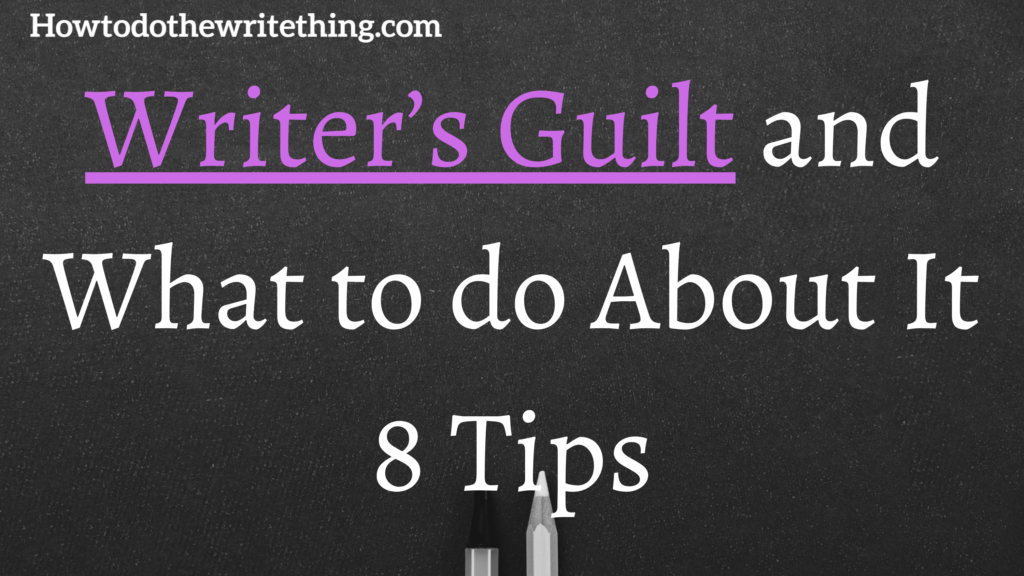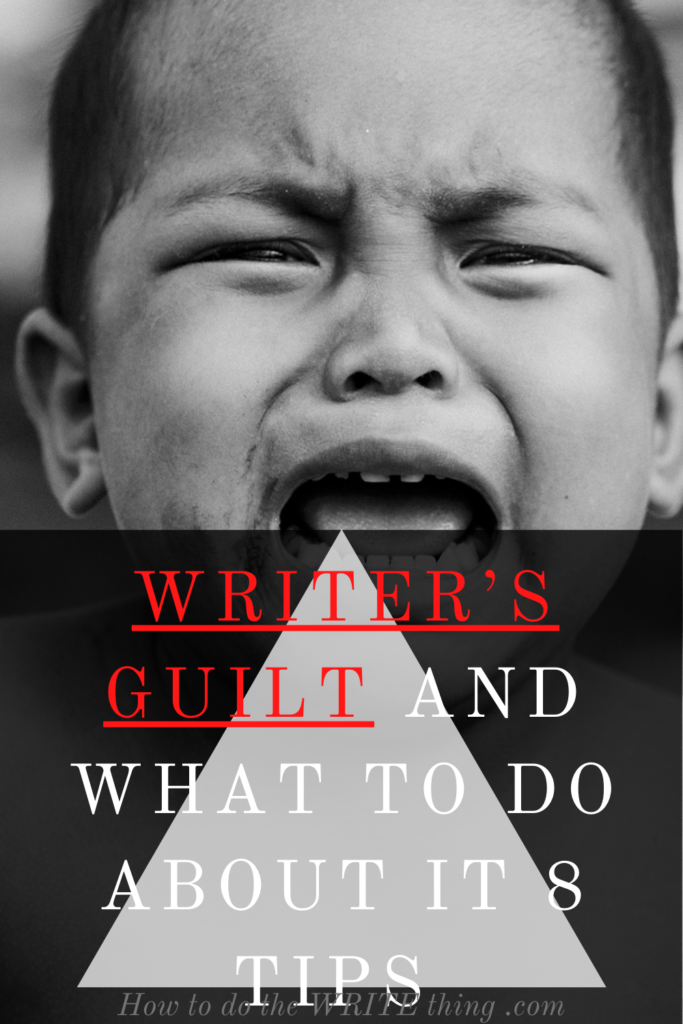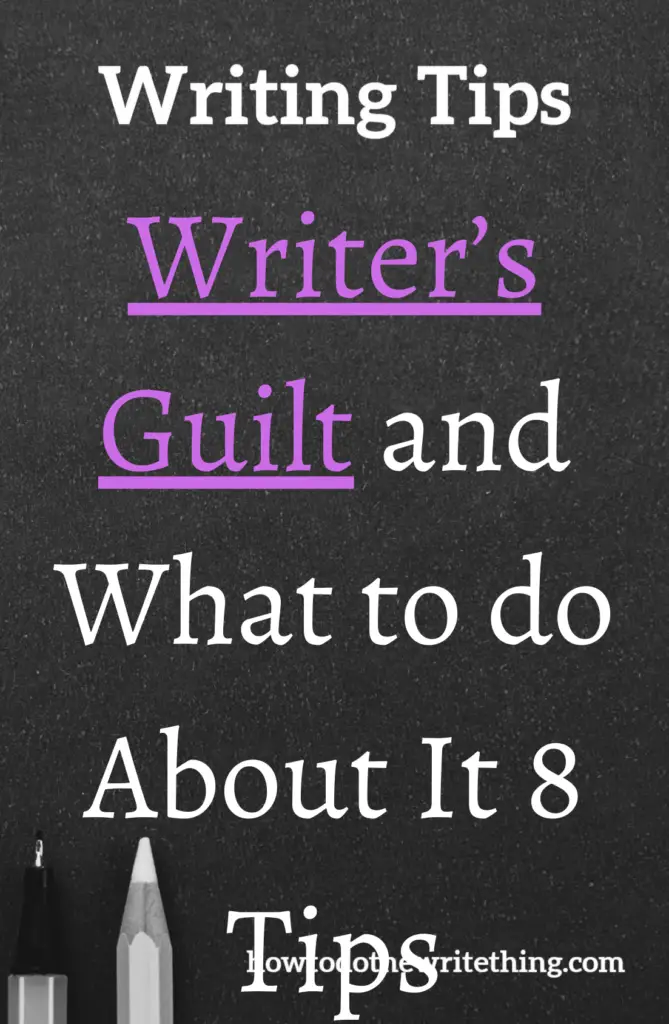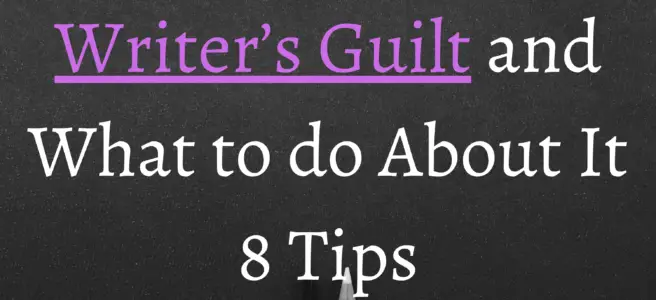
Writer’s Guilt and What to do About it.
Writer’s guilt is when you feel guilty for not writing.
Let’s say you’re watching a show when you know you could be writing, and then you feel guilty about it. Is this good or bad?
You decide to go to the movies with friends when you know that you could be writing and then you feel guilty about it. Should you feel bad about this?
Get a balance.
As a writer, I personally don’t think you should be writing every free second of your day. You should have a balance.
If you can you should try to get in the habit of writing 500 to 2,000 words a day. I say 500 because that would be the bare minimum for a bad day and 2,000 because some days the words are just flowing real easy.
It doesn’t mean you can’t go over or under that (everyone has their good writing number and bad writing number and after practicing writing for some time you easily figure out what yours is), but after spending some time writing you should really try to do other things with your time.
Even professional writers take time off and do other things that make them feel good about being alive.
The professional author Haruka Murakami has a daily practice of writing for 4-6 hours a day, but after that, he has a daily regimen of other things he likes to do and other things that he feels help keep him healthy and sharp.
Just like you try to have a work/ life balance you should have a writer’s life balance.
Spend a chunk of time writing and then move on with your day to accomplish other things and build relationships too. It’s healthy.
Rest from your writing.
It’s important to take breaks from writing. Creativity isn’t a never-ending well. We need to take a rest from the creative process.
Ways that we can rest from it is not doing it. Also, we rejuvenate our creativity by consuming other creative things.
Reading books, watching movies, watching shows, things like this help bolster our creative process.
Taking a walk and getting fresh air can help us solve a scene problem. Talking with friends and family can give us extra ideas for dialogue and the way other people say things.
Too much and you might experience burnout.
Writing excessively and for too long can lead to writer’s burnout.
You can get yourself to a place where writing is the last thing you ever want to do again and eventually I’m pretty sure you would just ignore it altogether and might not write anything for months or years.
You might even quit altogether because you pushed yourself too hard and that would be sad.
You will be able to produce more if you give yourself a reasonable daily pace. 1,000 words is a reasonable daily goal. In two months you will have about 60,000 words and that is a very good and reasonable goal.
When you put yourself into a sprint mode where you want to write 5,000 to 10,000 words a day. It is extremely draining and it’s hard for anyone to keep up that pace.
They say it is easier to avoid burnout than to come back from it. I can’t agree with this sentiment more.
Want to get paid to write? Check out Writing Paychecks
- There is a simple method over 30,000 people use to get paid for freelance writing online.
- Opportunities can get started in just minutes a day, all from your home couch.
- It’s easy to get started! No previous experience or degree required to start.
- Exclusive job listings for writers, updated daily.
Check out Writing Paychecks to see if you can start getting paid to write today.

Take time to see how others make stories and don’t feel guilty all it.
It’s important to realize that when we are taking in other stories (movies, tv, games, shows, books, talking to people) our brains are still working and they are doing the work of internalizing stories.
We shouldn’t feel guilty about this in relation to being a storyteller and creating stories for others to enjoy.
We need to put stories in to get more stories out.
Try new experiences instead of writing.
Writing is a balance between experience and recording it down so that others can experience it through your writing. One does have to tell stories well in order to succeed, but half of the equation is experience. That can be someone else’s experience or your own.
This could even be done by imagining the scene to try to hone in the awareness of what’s going on and how to explain it best to your reader without distracting them from imagining it for themselves.
In other words, you shouldn’t feel guilty for living life and experiencing life instead of always writing during your free time, because what you experience can and most certainly will help with your writing, even in subtle ways.
Sometimes it’s helpful to know why we are avoiding writing.
On bad writing days, we might only write 200 words and that’s okay.
But when we find ourselves putting it off over and over and over again, we should probably take time to ponder why we are avoiding it so heavily.
Often times it is fear that prevents us.
We’re actually afraid of not being able to put it together in the best possible way so instead, we just don’t do it at all.
If this is the case try to do it in steps to make it less daunting.
First, make a rough outline, such as “John meets Sarah for lunch. She finally tells him she’s pregnant. He doesn’t take the news well.”
By starting with a rough outline of what you want, you just made it 10 times easier on yourself to start and write something compared to avoiding it altogether.
Remember that you have the editing process where as long as you have something written, you will be able to see more clearly how it could be better than if you wrote nothing at all. Trust me, and trust your editing process.
I have had many moments writing where I can’t get the words right and I feel like quitting, but then I remind myself that I should just write down whatever is coming to my head at the moment and then later come back and rewrite it.
This has worked every single time that I can remember not feeling like I’m getting the right words at the moment.
Coming back to it later has always given so much clarity rather than stopping and having nothing to look at later.
Set a writing time.
For some people setting a writing time will be the best way for them to avoid writing guilt.
If your writing time is from 6-7 pm that is the time you sit down to write whether the words come or not.
Outside of 6-7 pm, you aren’t allowed to feel guilty about not writing because… it’s not writing time.
It’s a simple tool, but effective for some people and especially those that would call themselves planners.
Be actively consuming.
To help with writer’s guilt you can make better use of the other media you like to see.
- When watching a movie or show be on the lookout for foreshadowing, hooks, and twists that you enjoy and can add to your writing toolbox.
- When you’re researching how can that research add to your writing ability in your current or future projects?
- Read actively. Analyze the writing. What do you like about it? What do you not like? How would you change it to be better?
Enjoying Writer’s Guilt and What to do About it? Take a moment and consider sharing this social-friendly image to say thanks and feel free to comment with your thoughts below! 🙂


Want to get paid to write? Check out Writing Paychecks
- There is a simple method over 30,000 people use to get paid for freelance writing online.
- Opportunities can get started in just minutes a day, all from your home couch.
- It’s easy to get started! No previous experience or degree required to start.
- Exclusive job listings for writers, updated daily.
Check out Writing Paychecks to see if you can start getting paid to write today.



That’s all for the moment.
Hope this helps!
Happy writing!
Another Post you Might like:
Mythical Creatures | 7 Tips on How to Write Mythical Creatures
Other Popular Posts you might enjoy:
5 Tricks How to Hide Your Villain Right Before Their Eyes
10 Tips How to Write Villains that Play Mind Games with Their Victims
4 Tips How to Write your Character Hitting Rock Bottom
10 Toxic Bad Habits That’ll Crush Your Fictional Character’s Relationships
How to Write From Your Villain’s Mind.
How To Write 4 Scenes That Reveal Who Your Character Is Seamlessly
Psychopath: How to Write The Perfect Psychopath
8 Tips How to Write the Perfect Sociopath
Other Resources You Might Enjoy:
How to Start a Blog in 11 Simple Easy Steps in 2020
How to Write a Book: 32 Tips | Your MASSIVE Guide How to Write a Book
Interested in starting a blog of your own? Check out Bluehost.
Check out these FREE trial resources from Amazon for when you work from home (or are stuck at home 🙂 ) As an Amazon associate, if you do sign up or buy anything using Amazon links from our site we make a commission at no extra cost to you.
Free Prime Membership Trial:
Try Amazon Prime 30-Day Free Trial
Try Prime Discounted (Free Trial)
Get Unlimited Music for Free (30-day free trial):
Free Baby Registry:
Shop Amazon – Create an Amazon Baby Registry
Make your Free Amazon Wedding Registry:
Create an Amazon Wedding Registry
Enjoying Writer’s Guilt and What to do About it? Take a moment and consider sharing this social-friendly image to say thanks and feel free to comment with your thoughts below! 🙂


Make sure your posts are readable. Use this readability score check
Want to check out a writer’s community to test your writing and get feedback?
We hope you enjoyed: Writer’s Guilt and What to do About it!

